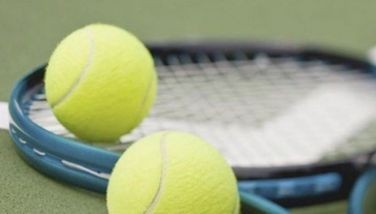Tac talks
January 13, 2007 | 12:00am
For two decades, Nathaniel "Tac" Padilla had been one of the mainstays of the Philippine shooting team, and has been one of the leaders in developing the sport. He has seen the perennial problems of the sport, and is also advocating a change in attitude towards the long-term planning. Although shooting is one of the 12 sports the Philippine Sports Commission is supporting in the run-up to the Beijing Olympics, Padilla says there is still a lot of work that needs to be done to make effective changes.
"There really was no preparation for the Asian Games," the multiple SEA Games gold medalist laments. "We did not participate in any international competitions before Qatar. They did not even buy any new supplies. The supplies we were using were left over from the Manila Southeast Asian Games. That’s why we didn’t have any expectations."
Considering the fact that his competitors had the advantage of travel, Padilla was still close to medaling. This illustrates both the innate skill of Filipino shooters, and, how lack of material resources holds them back.
"I was telling them that my Malaysian opponent trained for two years, traveling all over Europe," Padilla elaborates. "He trained in Moscow and other countries, and yet he only beat me by one point. It goes to show that even two years of training is not enough."
This reinforces his belief that the PSC’s naming 12 priority sports for the Beijing Olympics is not as welcome news as it appears to be.
"It is really very late in the day," Padilla emphasizes. "Our opponents have been training for years already. Can we afford to send our shooters to four or five international competitions a year? If you ask me, it will take four or five years of international training — and not starting from scratch — but our current crop of shooters, before we can be ready for the Olympics."
Another concern, given the problem with funding, is that shooting is not as popular as basketball or boxing.
"The solution would be to get more private sector funding, but we are not a high-profile sport for private corporations," the Asian Games veteran explains. "We are not a very popular sport, and they won’t get much exposure with us. So it has to be the government. But does the government have the money to spend on us to compete overseas? I don’t think so."
Part of the chicken-and-egg situation is that shooting also demands a lot of time, but being free to train is useless if you don’t have the ammunition or other resources to train with.
"What they want is right, to find people with time to train," Padilla adds. "But what will happen to those national athletes who have the time, if they don’t have the equipment? It will be useless. The Philippine Sports Commission and Philippine Olympic Committee have to change their orientation. We really have to think long-term if we want to win an Olympic medal. They shouldn’t just concentrate on the Southeast Asian Games. The Asian Games should be our standard."
On another note, I asked Padilla why he and Tito Palma decided to form the National Basketball Conference, which has grown by leaps and bounds, particularly in the Visayas and Mindanao.
"After the MBA folded, there was a clamor for a regional league," Padilla recalls. "So Tito and I and some of our friends decided to put one up. And we were able to make it less expensive, and the mayors and local businessmen were very interested."
Initially, Palma (now the NBC secretary-general) and Padilla revived the school-based National Basketball League at the request of Basketball Association of the Philippines secretary-general Graham Lim. After two years and impressive growth, Lim supposedly wanted to have the NBL name and the league back, and all to himself. This led to the birth of the NBC.
What sets the NBC apart is that the players’ salaries aren’t that big, and the travel is sponsored. Secondly, the teams are encouraged to develop new talent, which is why some teams have tryouts every season. Home teams play all 18 players, road teams 15. But each team must have at least 10 players from their region.
"That’s why the gyms are always packed when we play," says Padilla, the chair of the four-year old league. "The fans are so happy when their players beat even former PBA players. In fact, our biggest problem is security. Some of the fans get so involved, they storm onto the court."
Given the formula, Padilla is confident that the NBC can eventually expand to 30 or 40 teams, playing year-round in all the major cities and municipalities in the country.
"It is quite possible. This season will only be our fourth year, and the response has been very good. We are happy when our players move up to the PBL, and hopefully the PBA. We have seen how communities have accepted the league, and we have the formula that has proven to be successful.
And like everything Tac Padilla does, on target.
Catch tomorrow’s episode of The Basketball Show: Upgrade at 3 p.m. over Basketball TV. The program is supported by Cebuana Lhuillier and Molten.
"There really was no preparation for the Asian Games," the multiple SEA Games gold medalist laments. "We did not participate in any international competitions before Qatar. They did not even buy any new supplies. The supplies we were using were left over from the Manila Southeast Asian Games. That’s why we didn’t have any expectations."
Considering the fact that his competitors had the advantage of travel, Padilla was still close to medaling. This illustrates both the innate skill of Filipino shooters, and, how lack of material resources holds them back.
"I was telling them that my Malaysian opponent trained for two years, traveling all over Europe," Padilla elaborates. "He trained in Moscow and other countries, and yet he only beat me by one point. It goes to show that even two years of training is not enough."
This reinforces his belief that the PSC’s naming 12 priority sports for the Beijing Olympics is not as welcome news as it appears to be.
"It is really very late in the day," Padilla emphasizes. "Our opponents have been training for years already. Can we afford to send our shooters to four or five international competitions a year? If you ask me, it will take four or five years of international training — and not starting from scratch — but our current crop of shooters, before we can be ready for the Olympics."
Another concern, given the problem with funding, is that shooting is not as popular as basketball or boxing.
"The solution would be to get more private sector funding, but we are not a high-profile sport for private corporations," the Asian Games veteran explains. "We are not a very popular sport, and they won’t get much exposure with us. So it has to be the government. But does the government have the money to spend on us to compete overseas? I don’t think so."
Part of the chicken-and-egg situation is that shooting also demands a lot of time, but being free to train is useless if you don’t have the ammunition or other resources to train with.
"What they want is right, to find people with time to train," Padilla adds. "But what will happen to those national athletes who have the time, if they don’t have the equipment? It will be useless. The Philippine Sports Commission and Philippine Olympic Committee have to change their orientation. We really have to think long-term if we want to win an Olympic medal. They shouldn’t just concentrate on the Southeast Asian Games. The Asian Games should be our standard."
On another note, I asked Padilla why he and Tito Palma decided to form the National Basketball Conference, which has grown by leaps and bounds, particularly in the Visayas and Mindanao.
"After the MBA folded, there was a clamor for a regional league," Padilla recalls. "So Tito and I and some of our friends decided to put one up. And we were able to make it less expensive, and the mayors and local businessmen were very interested."
Initially, Palma (now the NBC secretary-general) and Padilla revived the school-based National Basketball League at the request of Basketball Association of the Philippines secretary-general Graham Lim. After two years and impressive growth, Lim supposedly wanted to have the NBL name and the league back, and all to himself. This led to the birth of the NBC.
What sets the NBC apart is that the players’ salaries aren’t that big, and the travel is sponsored. Secondly, the teams are encouraged to develop new talent, which is why some teams have tryouts every season. Home teams play all 18 players, road teams 15. But each team must have at least 10 players from their region.
"That’s why the gyms are always packed when we play," says Padilla, the chair of the four-year old league. "The fans are so happy when their players beat even former PBA players. In fact, our biggest problem is security. Some of the fans get so involved, they storm onto the court."
Given the formula, Padilla is confident that the NBC can eventually expand to 30 or 40 teams, playing year-round in all the major cities and municipalities in the country.
"It is quite possible. This season will only be our fourth year, and the response has been very good. We are happy when our players move up to the PBL, and hopefully the PBA. We have seen how communities have accepted the league, and we have the formula that has proven to be successful.
And like everything Tac Padilla does, on target.
BrandSpace Articles
<
>
- Latest
- Trending
Trending
Latest
Trending
Latest
Recommended




























